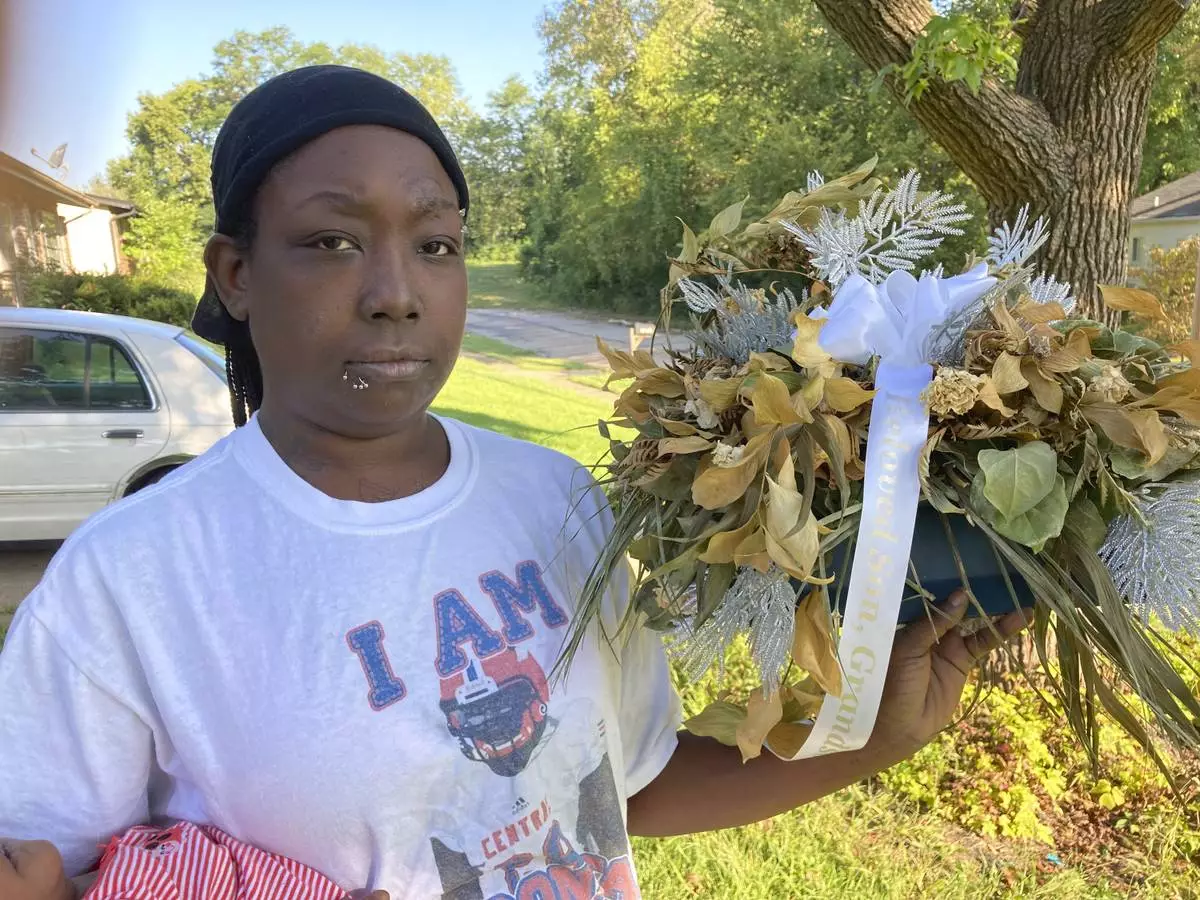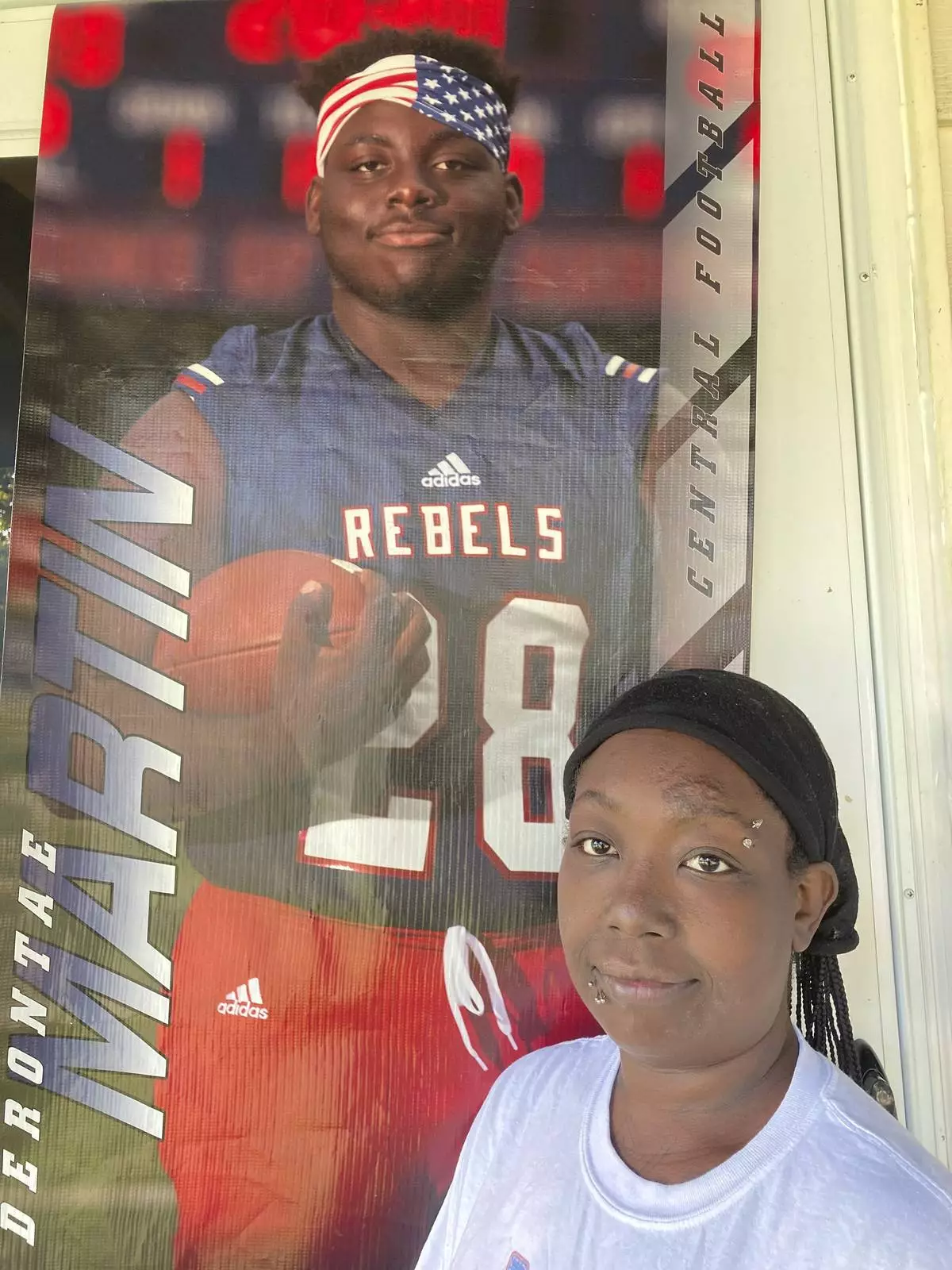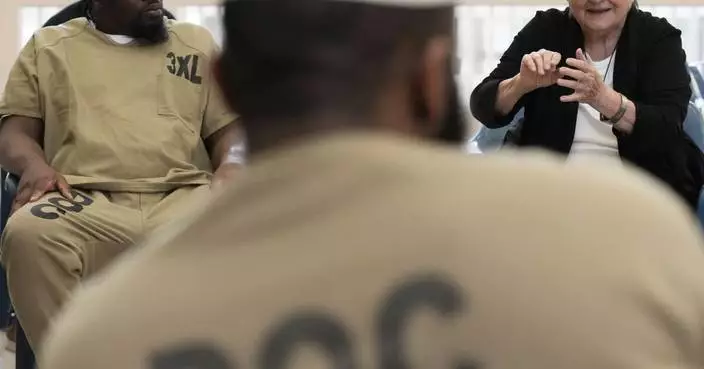R.I.P.
Dolores O'Riordan, whose urgent, powerful voice helped make Irish rock band The Cranberries a global success in the 1990s, died suddenly on Monday at a London hotel. She was 46.

In this May 6, 2004 file photo, lead singer Dolores O'Riordan from the The Cranberries performs onstage during a benefit show in aid of the United Nations UNHCR refugees fund held at the Royal Albert hall, central London. . (Yui Mok/PA via AP, file)
The singer-songwriter's publicist, Lindsey Holmes, confirmed that O'Riordan died in London, where she was recording,
"No further details are available at this time," Holmes said, adding that O'Riordan's family was "devastated" by the news.
Her Cranberries bandmates — Noel Hogan, Mike Hogan and Fergus Lawler — tweeted that O'Riordan "was an extraordinary talent and we feel very privileged to have been part of her life."

FILE - In this April 30, 2004 file photo, singer Dolores O'Riordan poses for photographers at the Sony Radio Academy Awards 2007, in London. (Yui Mok/PA via AP, File)
London's Metropolitan Police force said officers were called just after 9 a.m. Monday to a hotel where a woman in her 40s was found dead. The police force said the death was being treated as "unexplained."
The Hilton hotel in London's Park Lane confirmed that a guest had died on the premises.
Ireland's President Michael D. Higgins said O'Riordan and The Cranberries "had an immense influence on rock and pop music in Ireland and internationally."

FILE - In this Sunday, Jan. 27, 2008 file photo, Cranberries lead singer Dolores O'Riordan performs during the European Border Breakers awards, or EBBA awards, in Cannes, southern France. (AP Photo/Bruno Bebert, File)
O'Riordan was born on Sept. 6, 1971 in Ballybricken, southwest Ireland. In 1990, she answered an ad from a local band in nearby Limerick city — then called The Cranberry Saw Us — that was looking for a lead singer.
A name change and a confluence of factors turned The Cranberries into international stars. Their guitar-based sound had an alternative-rock edge at a time when grunge was storming the music scene.
The band's songs — on which O'Riordan was chief lyricist and co-songwriter — had a Celtic-infused tunefulness. And in O'Riordan the group had a charismatic lead singer with a distinctively powerful voice.

In this Dec. 16, 2015 file photo, Cranberries singer Dolores O'Riordan arrives at Ennis District Court, in Ennis, Ireland. (Niall Carson/PA via AP, File)
Heavy play on MTV for their debut single "Dream" and the singles that followed helped bring the group to the attention of a mass audience.
The Cranberries' 1993 debut album, "Everybody Else Is Doing It, So Why Can't We?", sold millions of copies and produced the hit single "Linger."
The follow-up, "No Need to Argue," sold in even greater numbers and contained "Zombie," a visceral howl against Northern Ireland's violent Troubles that topped singles charts in several countries.
Irish Prime Minister Leo Varadkar tweeted Monday that "for anyone who grew up in Ireland in the 1990s, Dolores O'Riordan was the voice of a generation. As the female lead singer of a hugely successful rock band, she blazed a trail and might just have been Limerick's greatest ever rock star. RIP."
The band released three more studio albums before splitting up in 2003. O'Riordan released a solo album, "Are You Listening," in 2007, and another, "No Baggage," in 2009.
The Cranberries also reunited that year, resulting in the album "Roses" in 2012.
For a time, O'Riordan was one of Ireland's richest women, but she struggled with both physical and mental health problems.
The Cranberries released the acoustic album "Something Else" in 2017 and had been due to tour Europe and North America. The tour was cut short because O'Riordan was suffering from back problems.
In 2014, O'Riordan was accused of assaulting three police officers and a flight attendant during a flight from New York to Ireland. She pleaded guilty and was fined 6,000 euros ($6,600.)
Medical records given to the court indicated she was mentally ill at the time of the altercation. After her court hearing O'Riordan urged other people suffering mental illness to seek help.
She told London's Metro newspaper last year that she had been diagnosed with bipolar disorder, and she spoke to the Irish News about her battles with depression.
O'Riordan said depression "is one of the worst things to go through," but that "I've also had a lot of joy in my life, especially with my children."
"You get ups as well as downs. Sure, isn't that what life's all about?" she said.
O'Riordan is survived by her ex-husband, the former Duran Duran tour manager Don Burton, and their three children.
ST. LOUIS (AP) — A federal investigation has concluded that a young Black man died of a self-inflicted gunshot wound inside a rural Missouri home, not at the hands of the white homeowner who had a history of racist social media postings, an FBI official told The Associated Press Wednesday.
Derontae Martin, 19, was at a prom party on April 25, 2021, when he died in an attic closet. The death was initially ruled a suicide. Relatives of Martin and others questioned that finding, and a jury at a coroner's inquest later ruled that Martin died by “violence," prompting the FBI investigation.
Chris Crocker, acting special agent in charge of the FBI's St. Louis division, said an extensive investigation concluded "that this was a self-inflicted gunshot wound, not a homicide or a hate crime.” Relatives were informed of the finding in December, Crocker said.
Messages were left with Martin's mother, Ericka Lotts, and his grandmother, Kimberly Lotts. The Rev. Darryl Gray, a St. Louis racial injustice activist who has counseled the family, said relatives are still struggling with Martin's death.
Martin was originally from the St. Louis area, but his family moved to Park Hills, a town of 8,500 residents about 60 miles (97 kilometers) southwest of St. Louis, when he was a child. Though that area of Missouri is about 95% white, Martin was popular and happy, Ericka Lotts has said.
Martin was a star defensive tackle and earned a scholarship to a small out-of-state college. He graduated from high school in 2020 but needed to bring up his entrance exam score before he could go to college. Ericka Lotts had relocated back to the St. Louis area, and Martin was living with her.
On the night of April 24, 2021, Martin was back in the Park Hills area. He attended the prom party of a young woman, a friend of a friend, at a home near Fredericktown, 27 miles (43 kilometers) south of Park Hills.
The home was owned by a man who in Facebook postings mocked foreign accents and defended the Confederate flag. He posted a meme showing a hand flipping the finger. It read: “Here’s my apology for being white.” Because the man is not charged with a crime, The Associated Press is not naming him.
Deputies and EMTs were called to the home at 3:01 a.m. on April 25, 2021. They found Martin in the attic, dead. Madison County Sheriff Katie McCutcheon said an initial autopsy indicated Martin died of a self-inflicted gunshot to the head. The Missouri State Highway Patrol was asked to investigate, and it concurred.
About 100 racial injustice activists staged a protest march in Fredericktown shortly after Martin's death. Gray said at the time that counter-protesters tossed two nooses at protesters and yelled racial slurs. That area of Missouri was home to Frank Ancona, a Missouri Ku Klux Klan leader shot to death by his wife in 2017.
A coroner's inquest jury was convened in July 2021. The AP obtained audio of the testimony through an open records request. Zachary Graham testified that he saw Martin in the attic closet, holding a gun to his own head.
“Did you see him shoot himself?” Graham was asked. “Yes,” he replied.
Others said Martin had been acting paranoid and aloof. Martin had methamphetamine in his system — enough to cause paranoia and irrational thinking — according to a toxicology report cited by Dr. Russell Deidiker, who performed the autopsy.
But Phillip Lawler testified that the homeowner told him weeks after the shooting that he killed Martin. “He just told me he didn’t like Black people and used the N-word,” Lawler testified.
The homeowner, at the inquest, denied ever saying anything like that. He testified that he was at the party and on the main floor of the home with others when the shot was heard, sending people scattering. Some of the young people, in testimony, backed up his account.
Crocker, in a phone interview with AP, said evidence showed that Martin had meth levels in his body "consistent with levels that often lead to extreme paranoia and sometimes even death.” He told others at the party he was worried that a gang member was after him, the investigation found. Someone gave him a gun for protection.
Martin shot himself “in the presence of a friend of his who was trying to talk him out of doing it," Crocker said.
FBI officials met with Martin's family in December to inform them of the findings. “We made sure to give them a whole understanding of the steps we took to reach this conclusion," Crocker said.
The U.S. Department of Justice’s Civil Rights Division provided two attorneys to help with the investigation, Crocker said. An FBI agent who specializes in hate crimes was assigned to the investigation.
“We really took extraordinary steps in this case to make sure we reached the right conclusion,” Crocker said.

FILE - Ericka Lotts holds a bouquet from the funeral of her son, Derontae Martin, Sept. 17, 2021, at her home in Ferguson, Mo. Martin died of a self-inflicted gunshot wound inside a rural Missouri home, not at the hands of the white homeowner who had a history of racist social media postings, an FBI official told The Associated Press on Wednesday, April 24, 2024. (AP Photo/Jim Salter, File)

FILE - Ericka Lotts stands next to a poster of her son, Derontae Martin, from his high school football playing days, Sept. 17, 2021, at her home in Ferguson, Mo. Martin died of a self-inflicted gunshot wound inside a rural Missouri home, not at the hands of the white homeowner who had a history of racist social media postings, an FBI official told The Associated Press on Wednesday, April 24, 2024. (AP Photo/Jim Salter, File)















